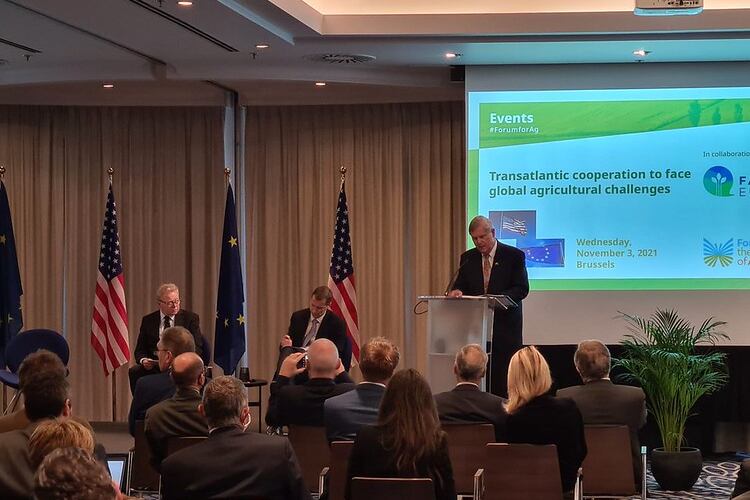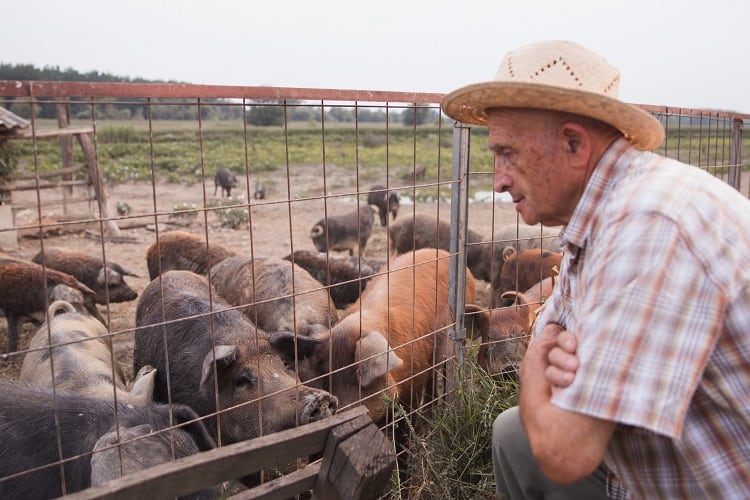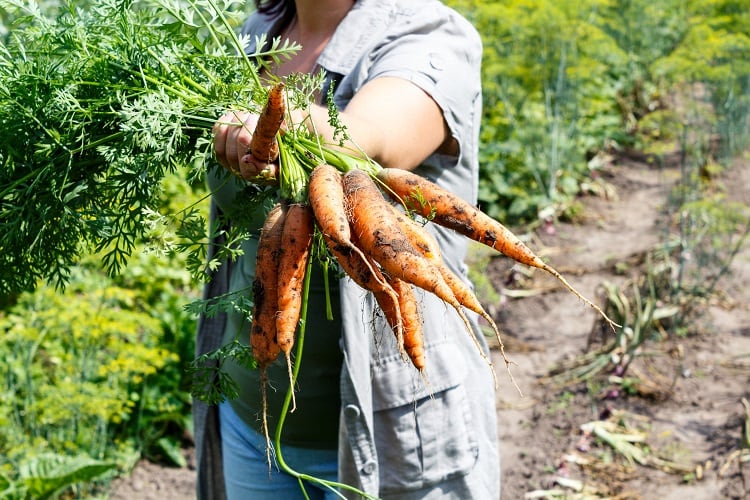The European Union and the USA have launched a transatlantic collaboration platform on agriculture. The aim, they said, is to take on the global challenge of sustainability.
“International collaboration to confront climate change and foster sustainability is paramount to mitigating the harsh and difficult future that awaits us as a global society. Climate change is already affecting the livelihoods of our farmers in deep and profound ways, from extreme weather volatility, to severe drought, to flooding, to wildfires and other catastrophic events that threaten our towns, cities and communities. We must rise to the challenge,” European Union Commissioner for Agriculture Janusz Wojciechowski and United States Secretary of Agriculture Secretary Tom Vilsack said in a joint statement.
Wojciechowski and Vilsack said the agreement represents a ‘new chapter’ in EU-US collaboration. The US Department of Agriculture and the EU Directorate General for Agriculture and Rural Development will exchange knowledge and information in a bid to promote ‘mutual understanding and trust’.
“We are reaffirming our mutual commitment to sustainable and climate-smart agricultural production, recognizing that we are both engaged in multiple, effective ways to achieve mutually desired outcomes,” the agricultural policy makers said.
They highlighted their shared belief that ‘science and innovation’ can deliver a more sustainable future for food as well as a desire to transition to a system that is good for producers, business, communities, consumers and the planet. “This includes fair and open markets at the local, regional, and international levels that bolster food security and sustainable food systems.”
The global powers also reaffirmed their commitment to alleviate hunger and poverty, support sustainable production, protect the environment and battle climate change. “This transformational initiative provides a platform for us to work cooperatively towards these goals.”
Striving for mutual understanding
Following the announcement, Wojciechowski delivered a speech highlighting common ground between US and EU agriculture.
In an attempt to breakdown some stereotypes about farming systems in each region, he noted the average size of a beef suckler herd in the US is around 50 cows, and half of all producers have less than 20 cows. In the EU, a ‘large proportion’ of crop production is concentrated on farms that are bigger than the US average, he continued. Both regions are also grappling with issues around depopulation and digital connectivity, the European Agricultural Commissioner noted.

“It is clear that changes are needed on a global scale,” Wojciechowski told the audience. “As two of the largest agri-food producers, importers, and exporters in the world, the United States and the European Union are in a strong position to lead this change.”
Wojciechowski was at pains to stress similarities between the US and EU, downplaying differences in systems and policy approaches as ‘amplified and exaggerated’.
But despite this reconciliatory tone, the fact remains that the gulf between the US and EU’s understanding of sustainable agriculture and the action required to promote it remains massive.
Just last month at the G20 Agriculture Ministers’ Meeting in Florence, US and EU regulators were seemingly at loggerheads, with the US urging other countries to join its Coalition on Sustainable Productivity Growth for Food Security and Resource Conservation (SPG) in a move widely believed to target the influence of the EU on global agriculture.
“We initiated this coalition because it is clear that increasing agricultural productivity is essential to meet the needs of a growing global population and ensure that food is affordable to hundreds of millions of people around the world,” Vilsack said in October.
The USDA chief has taken issue with Europe’s flagship Farm to Fork strategy, which calls for a 20% reduction in the use of fertilizer alongside a 50% cut in pesticides and antimicrobials by 2030. Vilsack has previously suggested this approach will result in additional costs for farmers and lower productivity.
Addressing the European Parliament in July, he said it was important to ‘recognise and respect’ the different attitude to sustainable agriculture in the EU. “We’ve evaluated Farm to Fork from our perspective and our evaluation suggests there may be challenges for some producers in Europe to comply, that productivity may be impacted, that lower income for some farmers may be experienced,” he noted.
Under the Biden administration, the US is prioritising not only productivity but profitability within its agricultural policy. While the US believes the approach espoused in Farm to Fork could jeopardise this, Vilsack observed that the policy offers a legitimate route towards more sustainable ag production in Europe. “There are multiple ways for us to get to the same destination and we have to respect those,” the US Agriculture Secretary said.
So, if the fundamentally different approaches taken by the US and EU aren’t causing tension between the powers and prompting the US to push back at the policies in Farm to Fork, what is? It all boils down to trade and market access, or more specifically the barriers that prevent US agricultural goods that don't conform to European standards from entering the bloc.
‘Sticky issues’ remain
“The relationship that we have with the EU is one that involves some very serious and difficult issues from a trade perspective… because of the different paths we are taking towards greater productivity and now greater sustainability,” Viksack explained.

Outlining key ‘sticky issues’ Vilsack pointed to the distinct approaches taken on GMOs, gene editing and the use of growth hormones in beef. In contrast to the EU’s determination to increase the amount of land under organic cultivation, he insisted that the US would support ‘diversity’ in agriculture and would not favour one method of production over another.
These are issues that have ‘stopped us for far too long’, he stressed, adding ‘if we are going to have a close relationship, a trade relationship, those issues have to be addressed in a meaningful way’.
According to Vilsack, if a comprehensive US-EU trade deal is ever to be reached, US agriculture will need to be given access to European markets. Something, he argued, American producers are currently largely denied. “The problem is our ability to enter your market is often constrained to the point where there is a fairly significant trade deficit between the US and EU. That makes it difficult for someone in my position to be able to talk about free trade and fair trade… Agriculture has the capacity to prevent politically with votes in Congress the passage of trade agreements.”
The solution to this deadlock, Vilsack suggested, is ‘not a simple process’. “It is one that does require a relationship, one that does require dialogue, one that does require creative thinking.”
The transatlantic collaboration platform on agriculture could be viewed as a tentative step in that direction, with shared learnings in research and development expected to benefit both parties. “As we transition to greener food production under the Farm to Fork Strategy, we want to engage with our American friends, to share our progress, and our experiences. I believe that we can learn a great deal from each other,” Wojciechowski explained.
Alarm bells ringing: Partnering with US ag ‘a recipe for disaster’?
But this meeting of minds is already ringing alarm bells in Europe.
America is well known for using the carrot of free-trade access to its large consumer base as a means to open up global markets for its agricultural producers, forcing others to accept US production standards in the process.
The risk to EU farmers in this scenario is that, under Farm to Fork, they would have to comply with standards that result in additional production costs. They would then be forced to compete with cheaper US imports that could leverage things like lower animal welfare requirements to boost yields and cut costs.
The European Commission must ‘strongly resist’ any attempt by the US to use the newly created transatlantic collaboration platform on agriculture to undermine the implementation of a healthier and more sustainable European food system, Compassion in World Farming EU warned.
“Partnering with the US on agriculture to tackle sustainability and climate change is a recipe for disaster given the apparently immutable vested interest of the American agribusiness lobby in maintaining the status quo regardless of its devastating impacts on public health, the environment and animal welfare,” said Olga Kikou, Head of Compassion in World Farming EU.
“Instead of cuddling up passively to the US, Brussels needs to actively defend the strategy against these attacks from across the Atlantic. Giving in to US pressure would betray the European public by undermining Europe’s goal of reaching carbon neutrality by 2050 and by squandering the opportunity to improve people’s lifestyles, their health and the environment, as well as animal welfare standards. The Commission cannot let that happen.”




